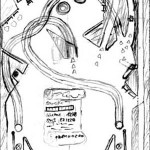Currently my main task for university is writing a long paper about some description logic in context middle-ware stuff. Before I begun I had to make a decision: which flavour of word-processing-software do I want to use? Out of OpenOffice, MS Office 2003, LaTeX und MS Office 2007 I picked the latter, mainly because of evaluation purposes (and some curiosity I must admit).
And soon I stumbled into problems with the new built-in changable style of citations, which is for sure a feature scientists have long been waiten for. But if the about a dozen built-in styles aren’t satisfying you, it becomes critical. Continue reading One note on citations in ms word 2007
On touchscreen-only phones
I must admit: I’m a geek when it’s on small powerful PIM devices. After owning a Treo 180 since 2005 I wasn’t able to go back to standard boring mobile phones. So I was going to get the XDA mini from O2 Germany, which was one of the 1st generation touchscreen-only PocketPC-phones out there (don’t rely on that).
And as we all have to face the upcoming multi-touch-screen-hype started by Apples iPhone these days, I wonder why the hell everybody thinks this is the end of phone keys. In my two-year experience with a nearly keyless phone I need to clear up with a common mistake in rating those new LG Prada, LG Mobile KS20, HTC Touch, Samsung P520 and so on (this list is too long): Typing text is pain on those devices. For a demo-video and and overview on how keyless devices feel like, I recommend the article by Dieter Bohn on HTC Touch vs. iPhone, Part 2.
Regardless of soft-keyboards with auto-completion, vibration-on-touch and all other kinds of emulating real keys it will NEVER feel like typing on real keys, believe me. In fact, it’s not possible to write without looking on the screen, ’cause you never know whether you hit the right “key” or whether you hit it hard enough at all. I mean, it’s possible to write text, of course, and I did it for nearly 2 years now. But it’s definitly beaten by the feel of real keys. So my next phone will be the HTC Touch Dual slider, with a 20-key keypad.
Well, sure I am a fan of huge displays with touchscreen functionality and cool apps based upon them. But to make it short: When it comes to typing a text longer than about 100 characters, real keys are second to none.
~~~ Cheers!
Sharing Confs on a dual-boot system – Part 1: Pidgin & Firefox
Recently I installed Feisty Fawn on my 2 and a half years old Asus Laptop and it works just like a charm (I really like those desktopFX). But since I have to use some MS stuff for university (like MS Project) and I get those progs for free (MSDNAA program) I’m using dual-boot on this machine. After working alternating in Windows and Linux I wondered whether there is a way to share some configuration data between both systems, since I use my favourite apps on both of them. Continue reading Sharing Confs on a dual-boot system – Part 1: Pidgin & Firefox
Reincarnation of “University”

Within the last 3 or 4 weeks I decided to further develop a small game application for the J2ME (Java Micro Edition), a.k.a. a mobile phone game. I begun this one with 2 fellow students at university for some kind of practical exercise of the lecture “Java in Embedded Systems” and after about 4 to 6 months we released a working but buggy alpha version. Which was ok for the course but a unreasonable demand for potentially end users. Finally 2 friends of mine, who served me as acceptance victims, surged me to implement at least a highscore. This was enough motivation – I reactivated the project and added some features, removed some bugs and made it to version 0.6. And for your convenience, I attached the game, please let me know your thoughts. Continue reading Reincarnation of “University”